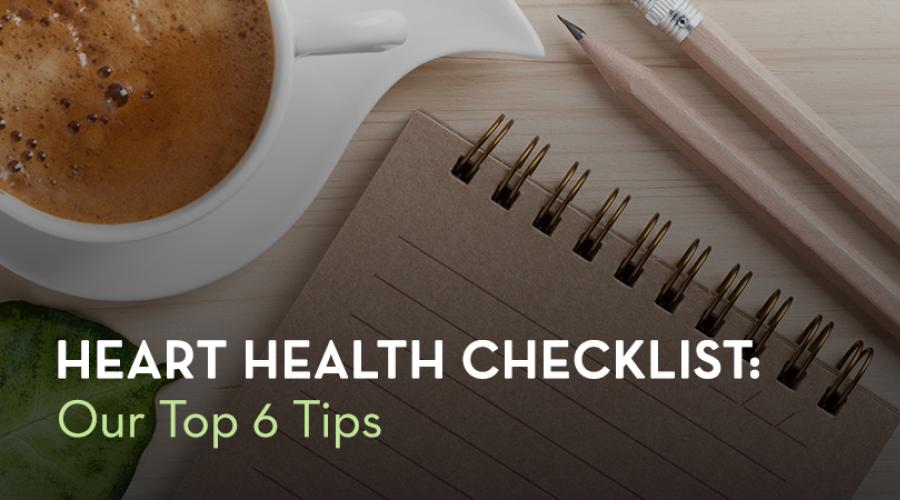
We tend to appreciate our hearts the older – and wiser – we get. Here are six simple and realistic ways to help keep your heart healthy.
Tip #1: Know Your Numbers
There’s a good you or someone close to you is at risk for heart trouble due to high cholesterol or blood pressure – but doesn’t know it. Over time and in different ways, these conditions cause damage that can cause a heart attack or stroke.
High cholesterol and high blood pressure, on their own, have no symptoms. This is why doctors sometimes call them silent killers.
Be sure to visit your doctor at least once a year. Ask about a blood test to measure cholesterol and be sure your blood pressure is checked. Make it a point to actually discuss those numbers with your doctor.
You may also consider calling your local chapter of the American Heart Association if you need extra help understanding what your numbers mean.
There are many options available for treating high blood pressure or high cholesterol, but those problems can’t be properly treated unless you know your numbers!
Tip #2: Get the Right Sleep
Sleep gives your body a much needed break. Now researchers have uncovered interesting links between sleep and heart health.
A study presented at the American College of Cardiology in 2012 showed people who got too little sleep were twice as likely to have a stroke or heart attack. Those getting too much were also found to have heart trouble.
It's time to start thinking of getting enough sleep ... as being smart, not selfish. Consider it your way of making sure you are around to care for others.
Although it didn’t prove a cause-and-effect relationship, the study was the first nationally representative sample showing an association between sleep duration and heart health.
But it’s not just the amount of sleep that seems to matter. The quality of that sleep appears to be very important.
In a 2015 study, researchers found adults who reported poor sleep quality had 20 percent more calcium buildup in their arteries than those who said they slept well.
So how much sleep does your heart really need? It varies by person, but six to eight hours of quality sleep each night seems right for most of us.
“It’s time to start thinking of getting enough sleep … as being smart, not selfish,” wrote Nancy Brown, CEO of the American Heart Association, in 2013. “Consider it your way of making sure you are around to care for others.”
Tip #3: Reach an Ideal Weight
Heart-healthy doesn’t mean skinny. It means finding your ideal weight.
Despite what you might see in glamor magazines, being underweight can actually hurt your heart as much as being overweight.
As we age, the combination of reduced muscle mass and decreased activity makes us need fewer calories. This means the calories we consume should be as nutrient-rich as possible.
Dietary supplements can be beneficial, but your needs may vary with time because we absorb and use certain nutrients differently as we get older.
Moderately portioned meals and small snacks, nutritionally balanced and spread throughout the day, are helpful in achieving and keeping an ideal weight.
Dietary supplements are popular with those who wish to support heart health. Along with diet and exercise, supplementation can be beneficial, but remember what you need may vary as you age, because our bodies absorb and use certain nutrients differently as we get older.
CoQ10, for example, plays a critical role in making the cellular energy your heart uses to function. But people taking the conventional (and most common) form of CoQ10 receive a more limited benefit starting around age 40. That’s when our bodies have a harder time converting conventional CoQ10 into heart-healthy Ubiquinol.
Be mindful of the supplements you select and be willing to change them as you age or based on your doctor’s advice.
Tip #4: Stay Away From Tobacco
The science is clear: tobacco smoke is terrible for your heart, and the benefits of avoiding it come quickly.
You probably know that smoking – and exposure to second hand smoke – increases the risk of lung cancer and breathing problems.
But it’s especially bad for your heart. Smoking can increase your blood pressure, thicken and narrow your blood vessels, cause dangerous blood clots and more.
In fact, most smokers will die from heart disease (or its complications) long before getting cancer.
The effects of cigarette smoking will kill more than 400,000 Americans this year. That number is even more sobering when you realize nearly 34,000 of those deaths will be caused not by smoking but by breathing secondhand smoke.
The science is clear: tobacco smoke is terrible for your heart, and the benefits of avoiding it come quickly.
Your body begins to heal within 20 minutes of your last cigarette, when your heart rate and blood pressure begin to drop. Circulation and lung function improve within three months; after just one year, your risk of heart disease is cut in half.
Tip #5: Go Easy on the Sugar
Most Americans consume at least 10 percent of their calories each day in the form of added sugar – an amount that’s been on the rise due in large part to our love of sugar-sweetened soda, energy drinks, pastries and various other processed foods.
But limiting the added sugar you eat each day is one way to be kind to your heart.
Limiting the added sugar you eat each day is one way to be kind to your heart.
In a major recent study, federal researchers found people who took in at least 25 percent of their daily calories from sugar were twice as likely to die from heart disease as those whose diets included less than 10% added sugar.
The typical American consumes around 22 teaspoons of added sugar every day. The American Heart Association recommends women bring that number down to six teaspoons and men consume no more than nine teaspoons (the amount found in one can of regular soda).
Remember that added sugar goes by dozens of names, including agave nectar, caramel, corn syrup, dextrose, fructose, fruit juice concentrate, glucose, honey, maltose and rice syrup.
Tip #6: Get a Mammogram (Women)
Mammograms are vital to catching breast cancer early but they can also provide a window into your heart health.
Radiologists are already trained to look at a mammogram for the buildup of calcium salts because its presence may indicate early cancer. While looking for these calcifications, researchers say your doctor can also look for a different kind of calcium buildup caused by too much cholesterol in the arteries of your breasts.
This fairly new method of screening is thought to be “a successful way, with no extra money or extra radiation, [for] determining a woman’s risk for cardiovascular disease at the same time she would be screened for breast cancer,” says Laurie Margolies, MD, director of breast imaging at Mount Sinai Hospital.
Although this technique shows promise, a yearly checkup with your primary care doctor remains the best first line of screening for heart problems.












